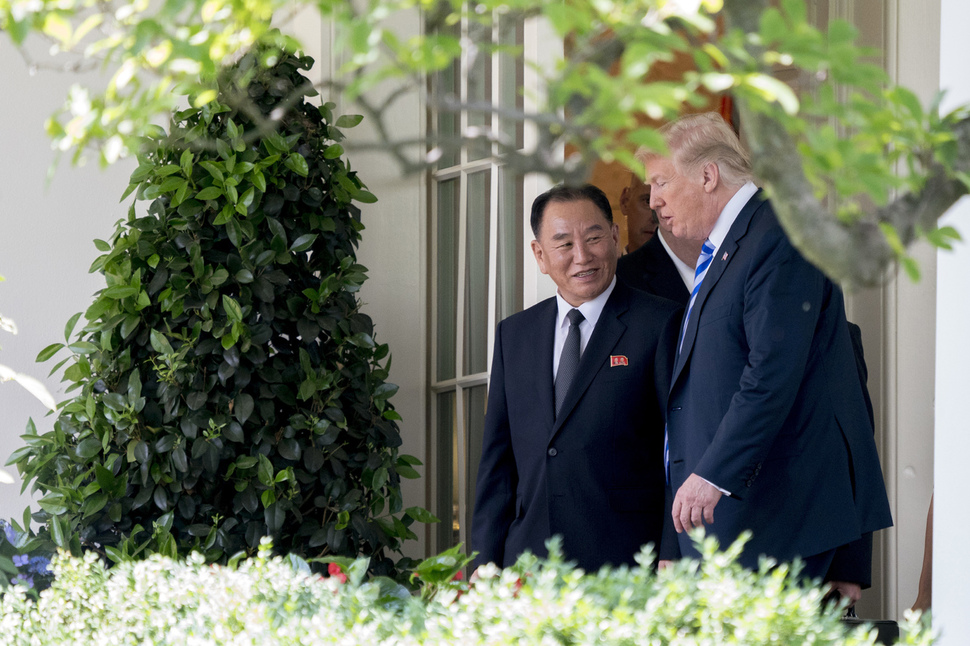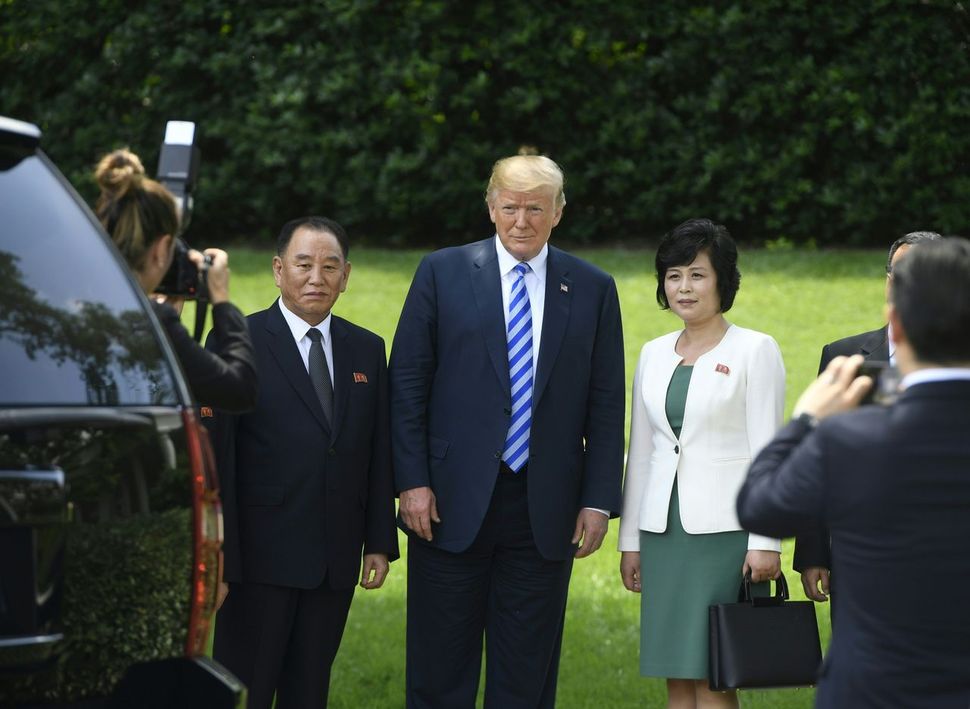 |
|
Vice chairman of the Workers’ Party of Korea (WPK) and director of the WPK United Front Department Kim Yong-chol (left) talks with US President Trump at the White House on June 1. On the same day, Trump told reporters, “the big deal will be on June 12,” reaffirming the North Korea-US summit in Singapore. (Yonhap News)
|
US President says denuclearization is “a process,” suggesting move away from all-in-one approach
After meeting Kim Yong-chol, vice chairman of the Workers’ Party of Korea (WPK) and director of the WPK United Front Department, on June 1, US President Donald Trump officially reconfirmed that the North Korea-US summit will be held in Singapore on June 12. In addition to this, Trump hinted at the possibility of officially ending the Korean War at Singapore and stated that he would not impose additional sanctions on the North. Trump’s meeting with Kim Yong-chol at the White House on June 1 lasted for more than 90 minutes after Kim delivered Trump a personal letter from North Korean leader Kim Jong-un. “We talked about [. . .] a lot of things. [. . .] But the big deal will be on June 12,” Trump told reporters after the meeting, while adding that “We’re not going to go in and sign something on June 12. [. . .] We’re going to start a process.” This is taken to mean that the results of the North Korea-US summit on June 12 will be announced as a communiqué that only contains the overarching principles and objectives and that the details will be discussed in subsequent talks. Trump said multiple times that he means to treat the June 12 summit as the beginning of the process of denuclearization. “It’ll be a process. I never said it goes in one meeting. I think it’s going to be a process,” Trump said. “But the relationships are building, and that’s a very positive thing.” Trump’s remarks can be taken as meaning that he has moved away from the “all-in-one” approach to denuclearization and acknowledged the difficulty of denuclearization. It suggests that he has set aside “compressed and swift denuclearization” and accepted “denuclearization as a process” through confidence-building. This represents a significant shift in position in the Trump administration’s approach to denuclearization. High possibility of declaring end of the Korean War at Singapore summit Trump also hinted several times at the possibility of declaring the end of the Korean War in Singapore. When reporters asked about the possibility of ending the war, Trump said, “We’re going to discuss it prior to the meeting. That’s something that could come out of the meeting.” While Trump had previously given his blessing to the discussion of officially ending the war during the inter-Korean summit, this was the first time he has openly suggested the possibility of the war ending being declared over during the Singapore summit. “We talked about ending the war,” Trump said of his meeting with Kim. “[T]his war has been going on — it’s got to be the longest war — almost 70 years, right? And there is a possibility of something like that [declaration],” he continued. “That’s more of a signing of a document that it’s very important in one way. Historically, it’s very important.” “Can you believe that we’re talking about the ending of the Korean War?” he asked reporters. “You’re talking about 70 years.” During the June 1 meeting, Trump appeared to have reaffirmed Kim Jong-un’s commitment to denuclearization and shared a fairly deep conversation with Kim Yong-chol about corresponding measures. When asked if he thought Kim Jong-un was committed to denuclearization, Trump replied, “Yeah, I do think so. He’d like to see it happen. [But] he wants to be careful.” “[Y]ou know — he’s not going to run and do things,” he added. “But I told [Kim Yong-chol], to be honest with you, look, we have sanctions on; they’re very powerful sanctions,” he continued. “We would not take sanctions off unless they did that [denuclearization].” The remarks appeared to send the message that Pyongyang should proceed swiftly with denuclearization if it wants sanctions lifted. But Trump also strongly suggested sanctions could be reduced or lifted completely if the conditions are right. “I look forward to the day when I can take the sanctions off of North Korea,” he said.
 |
|
US President Donald Trump (right) shakes hands with vice chairman of the Workers’ Party of Korea (WPK) and director of the WPK United Front Department Kim Yong-chol after their meeting at the White House on June 1. US Secretary of State Mike Pompeo (center) stands next to Trump.
|







